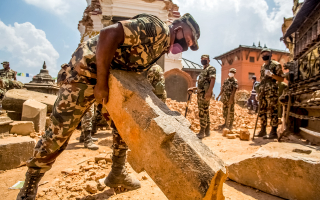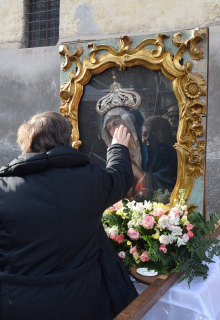IIC Point of the Matter Dialogue in Turin, Italy on 12 September 2018
PRESS RELEASE
In early September, seven remarkable speakers including conservators, soldiers and firefighters will explore why preserving heritage is essential for the psycho-social recovery of societies.
IIC in collaboration with ICCROM will be hosting a panel discussion as part of the Point of the Matter Dialogue series, bringing together seven specialists who have worked to conserve heritage through war, earthquakes and disaster. ‘Culture Cannot Wait: Integrating Heritage First Aid with Humanitarian Assistance in Crises’ takes place on Wednesday 12th September as part of IIC’s 27th Biennial Congress in Turin, Italy.
The conservation of artworks and heritage is usually associated with careful, painstaking work in museums and laboratories. But there is also another face to conservation: work undertaken in emergency circumstances, during war and civil unrest - or in the aftermath of earthquakes and other natural disasters. In these circumstances, conservators may find themselves working alongside soldiers and firefighters providing first aid for cultural heritage alongside a humanitarian aid effort.
Curators speaking at the event include Layla Salih, who has worked at Mosul museum in Northern Iraq for the last decade, and who has been trained in First Aid to Cultural Heritage in Times of Crisis by the International Centre for the Study of the Preservation and Restoration of Cultural Property. She will describe how, after the liberation of Mosul in 2017, she worked with UNESCO to carry out risk assessments and stabilization in Nimrud, the ancient Assyrian city targeted for destruction by Islamic State.
As well as working in the field, many speakers have also helped to raise cultural preservation up the political agenda, from Europe to the Middle East. Lt Col Tim Purbrick of the British Army has worked to re-establish a unit of military cultural property protection specialists: a group men and women who follow in the footsteps of the Monuments Men of the Second World War.
The speakers will consider the priorities of the agencies coordinating the emergency response and the role of salvage of cultural heritage in the psycho-social recovery of a society after the trauma of a disaster or war. Unfortunately, in most countries the emergency management plans of national, local, and military agencies do not include provisions for the rescue of cultural heritage: this seminar will explore how to address this.
IIC’s President Sarah Staniforth said, “We are extremely proud that many of IIC’s founders served as members of the Monuments, Fine Arts and Archives Commission (MFAA), or ‘Monument’s Men’ during the Second World War. We recognize that these cultural heritage specialists were responsible for saving thousands of historically important artworks and artefacts from irrecoverable loss. After nearly seven decades there is as much to do, share and discuss as ever.”
“Integrating cultural heritage into broader disaster response systems has many benefits – for the sustainability of society, in building resilience for the future, and in helping communities that have faced trauma,” said ICCROM Director-General, Webber Ndoro. “This is why ICCROM emphasizes the role of heritage in the greater emergency agenda, including first response. We are pleased to be part of this important event.”
This year’s Dialogue is a collaboration between the International Institute of Conservators (IIC) and International Centre for the Study of the Preservation and Restoration of Cultural Property (ICCROM). It takes place as part of IIC’s 27th Biennial Congress 'Preventive Conservation: The State of the Art', which is the first in a quarter of a century dedicated to the general topic of preventive conservation. The wider conference will deal with conservation in an extremely broad range of circumstances – from New York to Beijing and from Hampton Court palace tapestries to preserving wall paintings in a Mexico desert. The conference will be an opportunity to learn from the remarkable stories of a global community of conservators.
The full list of speakers at the seminar is:
- Lt Col Thierry Burger, an officer of the Paris Fire Brigade, now attached to the Department of Heritage Management.
- Veronica Piacentini, who headed the cultural heritage cell at the Civil Protection Command and Control Centre following earthquakes in Italy in 2016 and 17.
- Lt Col Tim Purbrick, who recently established a unit of military cultural property protection specialists in the British Army.
- Dr. Zeynep Gül Üna, a Professor in the Restoration Department at the Yildiz Technical University who has participated in search and rescue missions from Haiti to Turkey.
- Layla Salih, who has been a curator at Mosul museum for a decade.
- Rebecca Kennedy, Preservation Specialist at the Smithsonian's National Postal Museum and trained in First Aid for Cultural Heritage.
- Aparna Tandon, ICCROM's Project Manager for First Aid to Cultural Heritage in Times of Crises and Chair for this event.
Further information can be found at: www.IICTurinCongress2018.com
For more information please contact Graham Voce, Executive Secretary IIC
Tel: +44 (0)207799 5500 iic@iiconservation.org
Notes to editors:
Available for comment are:
- Amber Kerr FIIC, Vice President IIC and Head of Conservation, Lunder
- Julian Bickersteth FIIC, Member of IIC Council
- Sarah Stannage FRSA, Executive Director of IIC
- Catherine Antomarchi, Director of the Collections Unit, ICCROM
- Aparna Tandon, Project Manager for First Aid to Cultural Heritage In Times of Crisis, ICCROM
About the International Institute for Conservation of Historic and Artistic Works
Founded in 1950 by a number of members of the World War II ‘Monuments Men’, IIC is a London-based independent international organisation and learned society, bringing together cultural heritage professionals from around the world, educating, enabling and recognising excellence. This commitment drives everything we do – from the intellectually stimulating Congresses to activities specifically tailored to capture the imagination and curiosity of students of conservation.
Our Studies in Conservation records and publishes the latest developments in the field. Our enquiry-led Dialogues host discussions and the development of new ideas. Our Awards recognize and celebrate the greatest achievements in our sector and promote the work of conservation professionals for the common good. Our highly sought after Fellowships and Honorary Memberships acknowledge the status and contribution of the highest achievers of the profession.
IIC is a charity, and our important work is made possible by our supporters and a range of independent sources of funding including membership fees, fundraising events, congresses and publications.
About ICCROM
ICCROM is an intergovernmental organization working in service to its Member States to promote the conservation of all forms of cultural heritage, in every region of the world. It operates in the spirit of the 2001 UNESCO Universal Declaration on Cultural Diversity, which states that “Respect for the diversity of cultures, tolerance, dialogue and cooperation, in a climate of mutual trust and understanding are among the best guarantees of international peace and security.”
For more than six decades, ICCROM has partnered with Member States to support them in safeguarding heritage within their borders and beyond. Working at the international and governmental levels, and with institutions and professionals on the ground, the organization engages and informs new generations of professionals and the general public with an interest in heritage.
Those working on the front lines of heritage preservation, including scientists, conservators, museum curators, site managers, archivists, researchers and archaeologists rely on ICCROM for its world-class initiatives in conservation training, information, research, cooperation and advocacy.



